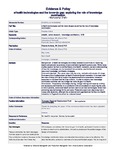eHealth technologies and the know-do gap: exploring the role of knowledge mobilisation
| dc.contributor.author | Asthana, Sheena | |
| dc.contributor.author | Sheaff, Rod | |
| dc.contributor.author | Jones, Ray | |
| dc.contributor.author | Chatterjee, Arunangsu | |
| dc.date.accessioned | 2020-02-27T12:15:51Z | |
| dc.date.available | 2020-02-27T12:15:51Z | |
| dc.date.issued | 2020-02-27 | |
| dc.identifier.issn | 1744-2648 | |
| dc.identifier.issn | 1744-2656 | |
| dc.identifier.uri | http://hdl.handle.net/10026.1/15410 | |
| dc.description.abstract |
Background: eHealth technologies are widely believed to contribute to improving health and patients’ experience of care and reducing health system costs. While many studies explore barriers to and facilitators of eHealth innovation, we lack understanding of how this knowledge can be translated into workable, practicable and properly resourced knowledge mobilisation (KM) strategies. Aims and objectives: This paper describes the aims, methods and outputs of a large European Union funded project (eHealth Productivity and Innovation in Cornwall and the Isles of Scilly (EPIC)) to support the development of a sustainable innovation ecosystem in Cornwall and the Isles of Scilly, in order to explore how knowledge mobilisation activities can help bridge the know-do gap in eHealth. Conclusions: Preparatory knowledge sharing, linkage making and capacity building are necessary preliminaries to co-production, with an emphasis on capturing the uses to which patients, carers and health workers want to put new technologies rather than promoting new technology for its own sake. Financial support can play a key role in supply-side dynamics, although the contextual and organisational barriers to eHealth innovation in England should not be underestimated. Key messages KM strategies can address the ‘know-do gap’ in eHealth, particularly if action is taken to reach out to stakeholders, link, and co-produce at the earliest stages of the design of innovations. Knowledge mobilisation takes considerable time and resources to be effective. We describe the aims, actions and outcomes of a very well-funded project; its long-term legacy has yet to be established. | |
| dc.format.extent | 0-0 | |
| dc.language | en | |
| dc.language.iso | en | |
| dc.publisher | Bristol University Press | |
| dc.subject | ehealth | |
| dc.subject | action research | |
| dc.subject | knowledge mobilisation | |
| dc.subject | NHS | |
| dc.title | eHealth technologies and the know-do gap: exploring the role of knowledge mobilisation | |
| dc.type | journal-article | |
| dc.type | Journal Article | |
| plymouth.author-url | https://www.webofscience.com/api/gateway?GWVersion=2&SrcApp=PARTNER_APP&SrcAuth=LinksAMR&KeyUT=WOS:000592706000010&DestLinkType=FullRecord&DestApp=ALL_WOS&UsrCustomerID=11bb513d99f797142bcfeffcc58ea008 | |
| plymouth.issue | 0 | |
| plymouth.volume | 0 | |
| plymouth.publication-status | Published | |
| plymouth.journal | Evidence & Policy: A Journal of Research, Debate and Practice | |
| dc.identifier.doi | 10.1332/174426420x15808912803267 | |
| plymouth.organisational-group | /Plymouth | |
| plymouth.organisational-group | /Plymouth/Faculty of Health | |
| plymouth.organisational-group | /Plymouth/Faculty of Health/Peninsula Medical School | |
| plymouth.organisational-group | /Plymouth/Faculty of Health/School of Nursing and Midwifery | |
| plymouth.organisational-group | /Plymouth/REF 2021 Researchers by UoA | |
| plymouth.organisational-group | /Plymouth/REF 2021 Researchers by UoA/UoA03 Allied Health Professions, Dentistry, Nursing and Pharmacy | |
| plymouth.organisational-group | /Plymouth/REF 2021 Researchers by UoA/UoA20 Social Work and Social Policy | |
| plymouth.organisational-group | /Plymouth/REF 2021 Researchers by UoA/UoA23 Education | |
| plymouth.organisational-group | /Plymouth/Research Groups | |
| plymouth.organisational-group | /Plymouth/Research Groups/FoH - Community and Primary Care | |
| plymouth.organisational-group | /Plymouth/Research Groups/Institute of Health and Community | |
| plymouth.organisational-group | /Plymouth/Research Groups/Plymouth Institute of Health and Care Research (PIHR) | |
| plymouth.organisational-group | /Plymouth/Users by role | |
| plymouth.organisational-group | /Plymouth/Users by role/Academics | |
| plymouth.organisational-group | /Plymouth/Users by role/Researchers in ResearchFish submission | |
| dcterms.dateAccepted | 2019-12-21 | |
| dc.rights.embargodate | 2021-2-26 | |
| dc.identifier.eissn | 1744-2656 | |
| dc.rights.embargoperiod | Not known | |
| rioxxterms.versionofrecord | 10.1332/174426420x15808912803267 | |
| rioxxterms.licenseref.uri | http://www.rioxx.net/licenses/all-rights-reserved | |
| rioxxterms.licenseref.startdate | 2020-02-27 | |
| rioxxterms.type | Journal Article/Review | |
| atmire.cua.enabled | Background: eHealth technologies are widely believed to contribute to improving health and patients’ experience of care and reducing health system costs. While many studies explore barriers to and facilitators of eHealth innovation, we lack understanding of how this knowledge can be translated into workable, practicable and properly resourced knowledge mobilisation (KM) strategies. Aims and objectives: This paper describes the aims, methods and outputs of a large European Union funded project (eHealth Productivity and Innovation in Cornwall and the Isles of Scilly (EPIC)) to support the development of a sustainable innovation ecosystem in Cornwall and the Isles of Scilly, in order to explore how knowledge mobilisation activities can help bridge the know-do gap in eHealth. Conclusions: Preparatory knowledge sharing, linkage making and capacity building are necessary preliminaries to co-production, with an emphasis on capturing the uses to which patients, carers and health workers want to put new technologies rather than promoting new technology for its own sake. Financial support can play a key role in supply-side dynamics, although the contextual and organisational barriers to eHealth innovation in England should not be underestimated. Key messages KM strategies can address the ‘know-do gap’ in eHealth, particularly if action is taken to reach out to stakeholders, link, and co-produce at the earliest stages of the design of innovations. Knowledge mobilisation takes considerable time and resources to be effective. We describe the aims, actions and outcomes of a very well-funded project; its long-term legacy has yet to be established. |


